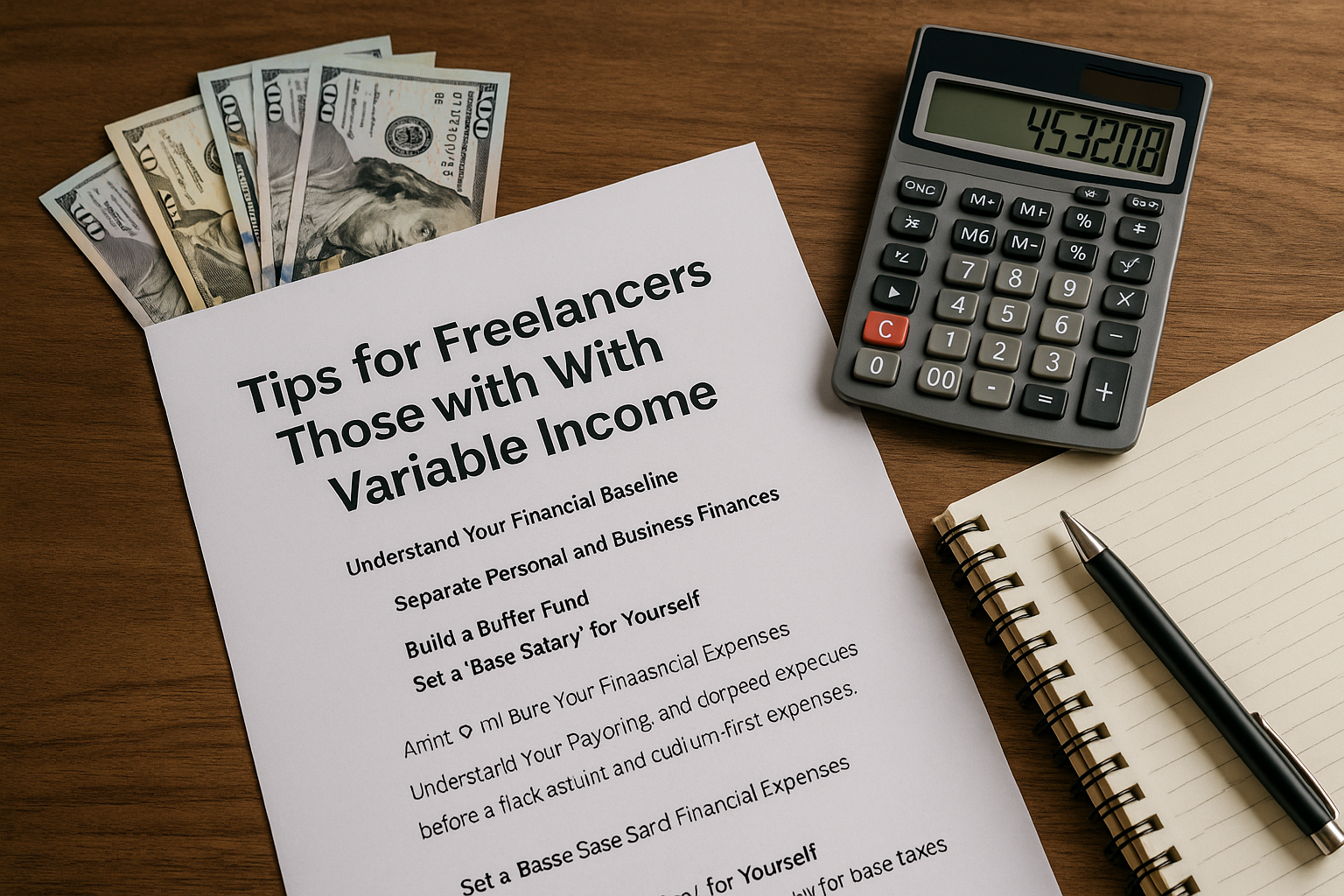Managing your personal finances can be challenging — especially when your income is inconsistent. Whether you’re a freelancer, a gig worker, or someone whose earnings depend on commissions or project-based work, the lack of a stable paycheck demands a different strategy. In this guide, you’ll learn actionable tips to gain control over your finances, even when your income fluctuates from month to month.
Understand Your Financial Baseline
Before you can manage your money effectively, you need to understand your financial baseline — the minimum amount you need to cover essential expenses each month.
Create a List of Fixed and Essential Expenses
These are the costs you must cover regardless of how much money you make:
- Rent or mortgage
- Utilities
- Groceries
- Insurance
- Transportation
- Minimum debt payments
Calculate how much you spend on these essentials per month. This number will serve as your non-negotiable minimum — your survival budget.
Separate Personal and Business Finances
Many freelancers mix personal and business income, which creates confusion during tax season and makes financial tracking harder.
Open Separate Accounts
- Use one account for receiving payments and handling business expenses.
- Use a second account for personal spending.
This not only keeps things organized but also helps you see clearly how much you can safely pay yourself.
Build a Buffer Fund (Emergency Fund for Freelancers)
A buffer fund acts like a cushion for low-income months. While a traditional emergency fund covers unexpected events, a buffer fund is designed specifically for income variability.
Aim for 3–6 Months of Essential Expenses
Set aside part of your earnings during good months until you build a comfortable safety net. This fund will protect you when projects are delayed or clients pay late.
Set a “Base Salary” for Yourself
Even if your income changes monthly, try to standardize what you pay yourself. This helps with budgeting and keeps your spending consistent.
Example:
- You earn $3,000 one month and $5,000 the next.
- Instead of spending more in the higher-income month, you pay yourself $3,000 each month and keep the rest as savings or for taxes.
This habit helps stabilize your lifestyle, even if your actual earnings fluctuate.
Plan for Taxes Year-Round
One of the most common mistakes among freelancers is ignoring tax obligations until it’s too late. Freelancers often don’t have taxes automatically withheld, which means you must set this aside yourself.
How Much to Save for Taxes?
Set aside 25–30% of your income for taxes, depending on your location and tax bracket. Use a dedicated savings account for this purpose and treat it as a non-negotiable expense.
Budget for Irregular Income
Traditional budgeting methods don’t always work well with variable income. Instead, use a priority-based budget.
The “Hill and Valley” Approach:
- In high-income months (“the hills”), prioritize saving and covering long-term expenses.
- In low-income months (“the valleys”), draw from savings and stick to essentials.
Budgeting should always start with what you know you need, not what you hope to earn.
Diversify Your Income Streams
One way to add stability is by diversifying where your money comes from.
Multiple Freelance Clients or Projects
Avoid relying on a single client. If that client leaves, your income could drop to zero. Spread your skills across several projects or platforms.
Passive or Semi-Passive Income Ideas:
- Online courses
- Affiliate marketing
- Selling digital products
- Blogging or YouTube (if monetized)
This won’t make you rich overnight but can provide extra support in slower months.
Track Every Dollar
Freelancers often face irregular payments, which can make it easy to lose track of spending. That’s why tracking is essential.
Use Budgeting Tools
Apps like YNAB (You Need A Budget), Mint, or PocketGuard can help you stay on top of your income and expenses. Regular tracking prevents overspending and shows you financial trends.
Cut Unnecessary Expenses During Lean Periods
When your income dips, you should be ready to adjust your spending habits.
Identify Flexible Spending:
- Dining out
- Subscriptions
- Entertainment
- Online shopping
Have a list of these in advance so you know what to cut first when you need to tighten the budget.
Prioritize Insurance and Financial Protection
Freelancers don’t have access to employer-provided benefits, which means you’re responsible for protecting yourself.
What You Should Consider:
- Health insurance
- Disability insurance
- Liability insurance (if relevant)
- Retirement savings (like IRA or Roth IRA in the US)
It may seem like an extra cost, but not having protection can result in much greater financial losses.
Use Invoices and Contracts Wisely
Delayed payments are common in freelance work, but they can be minimized.
Tips to Get Paid on Time:
- Always use clear contracts with payment terms.
- Send invoices promptly and professionally.
- Use invoicing tools like FreshBooks or Bonsai.
- Follow up with clients before the due date.
Getting paid faster improves your cash flow and allows you to plan better.
Keep Learning About Money
Managing finances when you earn inconsistently isn’t a one-time lesson — it’s a lifelong habit.
Learn From:
- Books on personal finance (like The Simple Path to Wealth or I Will Teach You to Be Rich)
- Financial podcasts
- YouTube channels focused on budgeting and investing
- Courses tailored for freelancers
The more you know, the more confident you’ll be in navigating money matters.
Final Thoughts: Stability Is Built, Not Given
Being a freelancer or someone with variable income means you may never have the exact same financial picture from one month to the next. But that doesn’t mean you can’t create consistency, security, and confidence in your financial life.
With the right mindset, smart planning, and consistent habits, you can take control of your money — and not let it control you.
